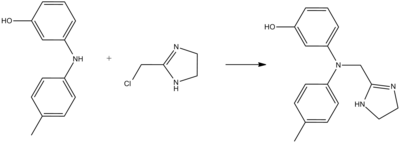Phentolamine
This hypotension is sensed by the baroreceptor reflex, which results in increased sympathetic nerve firing on the heart, releasing norepinephrine.
In response, the β1 adrenergic receptors on the heart increase their rate, contractility, and dromotropy, which help to offset the decrease in systemic blood pressure.
Unlike the α1 selective blockers, phentolamine also inhibits the α2 receptors, which function predominantly as presynaptic negative feedback for norepinephrine release.
By abolishing this negative feedback phentolamine leads to even less regulated norepinephrine release, which results in a more drastic increase in heart rate.
[5] It also has usefulness in the treatment of cocaine-induced cardiovascular complications, where one would generally avoid β-blockers (e.g. metoprolol), as they can cause unopposed α-adrenergic mediated coronary vasoconstriction, worsening myocardial ischemia and hypertension.
